First, there’s curiosity, then, there’s courage and thereafter, the commitment to see it through. When you are your own boss and sole employee reporting to yourself, as an early-stage, one-person microbusiness working with maybe contracted help, your job does not have a nine-to-five playbook. As you wear multiple hats, your only guide is a single-minded focus and the freedom to juggle around dreams and deadlines. FORBES AFRICA takes a look at the founders of some of these startups stepping up in search of innovative and creative ideas and solutions for their customers, communities and themselves. Meet the continent’s Rising tide of singular go-getters, the solopreneurs.
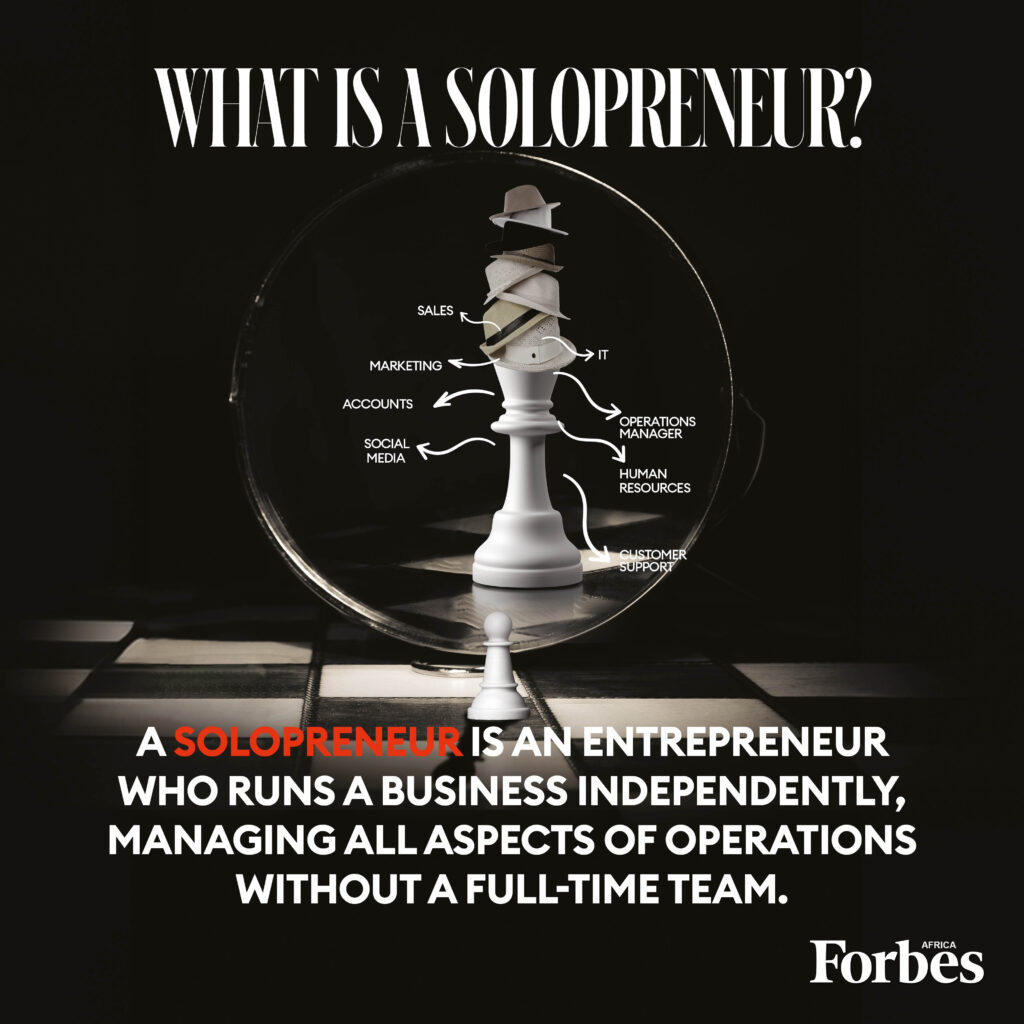
Photography Assistants: Sbongakonke Dlaminia and Themba Mahori
Stylist: Deneal Van Wyk
Outfits: MAXHOSA AFRICA, Ephymol, Suited For Her, Bride&co and Eurosuits
Makeup: Sibulele Sisilana
Hair: Ketleng Hatshejame
Props: House of Chess
Studio: Glow Hire, Johannesburg
Strategy – check. Risk appetite –check. Resilience – check.
The journey of entrepreneurship can easily be likened to a game of chess, where every astute move is key.
And whilst one cannot plan for every scenario – such as external volatility, influx of competition or economic downturn – the ability to strategize your moves accordingly and with deliberated dexterity can be the difference between ‘winning’ and ‘failing’.
Loading...
This is especially true in the nascent phases of entrepreneurship for those taking the first step on their own – even if they plan to expand their staff at a later stage, outsourcing contractors and suppliers as the business evolves – but for now, the buck stops with them.
A solopreneur is popularly defined as someone running a one- person enterprise or initiative and is both the founder and creator, solely responsible for all actions and deliverables.
The prospect of going it alone and battling the odds may seem daunting for some, but studies, such as the 2021 report by MBO Partners, estimate that there are about 41 million solopreneurs in the United States alone. Furthermore, 82% of them are satisfied with keeping their businesses small and 56% want to work alone. For Africa, collectively, this data is much more difficult to gather, however, reports indicate that the numbers are noteworthy. In the continent’s economic hub South Africa, in particular, the township economy can be considered one of the biggest drivers of solopreneurship. “There’s probably two distinct groups,” GG Alcock, author of Kasinomics (on South Africa’s informal economies), explains to FORBES AFRICA. “The one group is people who have no alternatives – they can’t find another job. It starts off basically as a little side hustle, and then becomes bigger.” The second group, says Alcock, are people who do this as their primary means of income. “The typical person would be people doing things like selling fruit and vegetables, [cooking] amagwinya (fat cakes), or a [work-from]-home stylist who does not have a [traditional] salon – they’re doing [the business] from the back room or something. Within the auto sector, you [find] a lot of kasi-mechanics.”
In this fairly unregulated or undocumented sector, statistics are several and varied.
The FinScope MSME South Africa 2024 Survey states that there are approximately three million medium, small and micro-entrepreneurs in South Africa, employing around 13.4 million people. Further to this, more than 2.5 million micro-enterprises make up the sector, with 72% operating informally. However, the SMME Quarterly Update 1st Quarter 2024 by the Small Enterprise Development Agency (SEDA) indicates that the total number of Small, Medium and Micro Enterprises (SMMEs) declined by 1.3% year- on-year to 2.67 million in the first quarter of 2024, down from 2.71 million in the first quarter of 2023.
According to The African Youth Survey 2022, released by the Ichikowitz Family Foundation, Africa boasts the world’s highest rates of entrepreneurship, with more than one-in-five working- age Africans engaged in starting a new business. In addition, more than three-quarters of the youth are planning to start one within five years.
Statista reports that the number of startups in Nigeria is estimated to have exceeded 3,360 in 2022, the highest number in Africa, followed by Kenya and South Africa.
“I see solopreneurship and micro-entrepreneurship as playing a crucial role in contributing to economic empowerment in South Africa, and in stimulating local economies,” says Rehana Cassim, a Professor of Company Law at the University of South Africa (UNISA). “First, [they] create jobs for themselves and for those they employ, which is vital for economic upliftment in African countries such as South Africa, which has one of the highest rates of unemployment in the world. Secondly, they enhance services and productivity.”
Sanisha Packirisamy, Chief Economist at Momentum Investments Group, tells FORBES AFRICA that “entrepreneurs introduce innovative products and services, reducing reliance on traditional sectors and enhancing economic resilience in the face of potential economic shocks”.
It’s also not uncommon for solopreneurs to phase out of the startup phase and move into scale-up mode, which, according to Alcock, is something entrepreneurs should aspire towards.
“We talk a lot about creating startups and my argument is that the opportunity is around scale-ups, not startups, because to start a business is very difficult, but to take a business that someone has started and scale it and make it grow, is much easier and represents a greater economic opportunity.”
Small businesses make up a large portion of the private sector and yet financial support is still an issue for many of the startups on the continent.
This point is reinforced by a 2021 brief from the Cen- ter for Strategic & International Studies (CSIS) titled, Supporting Small and Medium Enterprises in Sub-Saharan Africa through Blended Finance. It states that sub- Saharan Africa has 44 million micro, small, and medium enterprises and 51% of these businesses require more funding than they can currently access.
However, Omar Baig, Managing Executive for ARO Retail and Business Banking at ABSA, says that the appetite for SME funding in Africa is continually growing and that in 2024, the bank had seen double-digit growth in funding applications.
“Innovative products are the order of the day, to truly support this key sector for African growth, not just with financing but with digital solutions like Absa Mobi Tap, which provides SMEs with the ability to accept payments by simply using their smartphones.
“We are seeing that SMEs are no longer your traditional brick-and-mortar operations. While the demand for funding is high, the demand for convenience and intuitive banking is equally so,” says Baig.
African Bank Chairman, Thabo Dloti, believes that financial institutions can play a transformative role in the growth of SMEs by adjusting their business models to be more flexible and inclusive.
“At African Bank, for example, we’ve recognized the need for products that address not only the funding needs but also the holistic support for SMEs, such as mentorship, market access, and financial education. By reducing traditional barriers, such as rigid collateral requirements, and leveraging technology to assess risk more effectively, we can offer tailored financial solutions that meet SMEs where they are,” he tells FORBES AFRICA.
“Additionally, financial institutions should partner with government and community organizations to support capacity-building programs, ensuring that these enterprises not only survive but thrive and contribute meaningfully to our economy.”
For solopreneurs, managing every aspect of the business themselves, from running it to finding customers and marketing the business, can be challenging. The tasks require determination and perseverance.
However, according to Professor Cassim, technology has contributed immensely to this ultimate strategic play, allowing micro-entrepreneurs to thrive.
“In the Fourth Industrial Revolution, technology is essential to grow a business. Social media groups, online communities, and online forums are useful tools for enhancing visibility and making the public aware of the business, products and services of a solopreneur,” she adds.
“By building a strong online presence, [they] can establish credibility, enhance their reputation, and attract new customers. A strong online presence could also open the door for networking and collaboration opportunities, and could enable solopreneurs to learn from the experiences of others.”
The micro-entrepreneurs in this feature, who started out as solopreneurs and a few who continue to go it alone by choice, care about profit and purpose in equal measure, but their intended impact on the community and contribution to creating employment has been the game plan all along.
Packirisamy believes it is what many local entrepreneurs strive towards.
“This in turn can create further business and growth opportunities in an economy, particularly in underserved areas,” she adds. “It can also promote economic participation in marginalized groups and begin to address social inequalities.”
At the heart of the matter, solopreneurship is not just about redefining the parameters of ‘the game’ but also contributing to community development by investing in the surrounding neighborhoods, supporting local suppliers and creating a sense of community ownership.
On the following pages, we profile some of the stories and successes of micro-entrepreneurs who have forayed on their own, with nothing but a dream and the courage to stay the course.
The list follows no particular order
“Behold her, single in the field, Yon solitary Highland Lass! Reaping and singing by herself; Stop here, or gently pass! Alone she cuts and binds the grain, And sings a melancholy strain; O listen! for the Vale profound Is overflowing with the sound.“– From William Wordsworth’s The Solitary Reaper, 1805
APAMPA OLUWADAMILOLA OWOLABI
(DAMMY TWITCH)
Founder • Polar Films Production, Director and Photographer Sector • Film and Music Nigeria

Two years ago, we met a reserved but resolute Apampa Oluwadamilola Owolabi in Botswana at a photoshoot for the FORBES AFRICA 30 Under 30 list. In November 2024, he walks into the studio in Johannesburg, all the way from Nigeria, for a photoshoot for the cover of this edition, with a swing in his step and an all-new energy.
“A lot has changed,” he exclaims with a laugh, as we start the interview. From directing music videos for Nigeria’s superstar musician Davido – some of which have garnered millions of views – to rubbing shoulders with American singer-businesswoman, Rihanna, Owolabi, widely known as ‘Dammy Twitch’, explains that his contribution to the creative economy on the African continent is different to that of ‘traditional content creation’.
“Anybody can do what I do, but people contract me because they know there is a particular way I do it. It is the Dammy way,” he says. “As an entrepreneur, the first thing that you need to have is honesty. If you’re not honest, it will [show] in your business. Like I said, anyone can do what I do but there’s something there that [the client] trusts and can feel when they have me on their project. Yes, expertise is one but honesty is another, and mixing these two together really helps.”
Owolabi’s production company has worked with Google, mobile device company, Infinix, and other corporates such as TECNO Mobile, Nestlé and The Coca-Cola Company as well as artists such as Nigerian rapper and singer Omah Lay, and other international stars such as Zlatan, DaBaby and Yung Bleu. Though he does not have a permanent team, Owolabi is not shy about contracting people on an ad hoc basis.
“It is a risk being your own one-man power [business] but I know that I do not know everything,” he says.
“[That is why] it’s about being able to delegate to people who may have special expertise that you may not have. I will never force a contract on someone if they don’t have the right expertise.”
GLORINAH KHUTSO MABASO
Founder • Renaissance Design
Sector • Design
South Africa

“My journey started with being obsessed with Top Billing (lifestyle TV show) for years, and so I always envisioned myself becoming an interior designer,” says Glorinah Khutso Mabaso, founder of multidisciplinary creative agency, Renaissance Design. Her talent can be spotted from the walls to the ceiling of the Nando’s food outlet in Paarl, Cape Town, for example, showcasing a captivating display of African art. “I have an academic side to my business, so I start my creative process with research because I’m invested in preserving ancient African tribes. It always starts with reading or researching; watching documentaries wherever I can; maybe even having sit-downs with elders or monarchs and getting that kind of information.”
From Momentum to Woolworths, Mabaso has created designs for several leading corporates, incorporating intrinsic African patterns that celebrate the continent. While Mabaso does all the work by herself, technology plays an important second lead in her business. “I don’t have any permanent employees but recently, I have started working with a virtual assistant to take care of some of my daily tasks.”
She was also one of the 12 entrepreneurs selected for Création Africa’s 2024 incubation program, which is led by the Embassy of France and French Institute.
JEANNE SHEILA UWIBONA
Founder • Sheila’s Honey
Sector • Bee Farming and Food Services
Rwanda
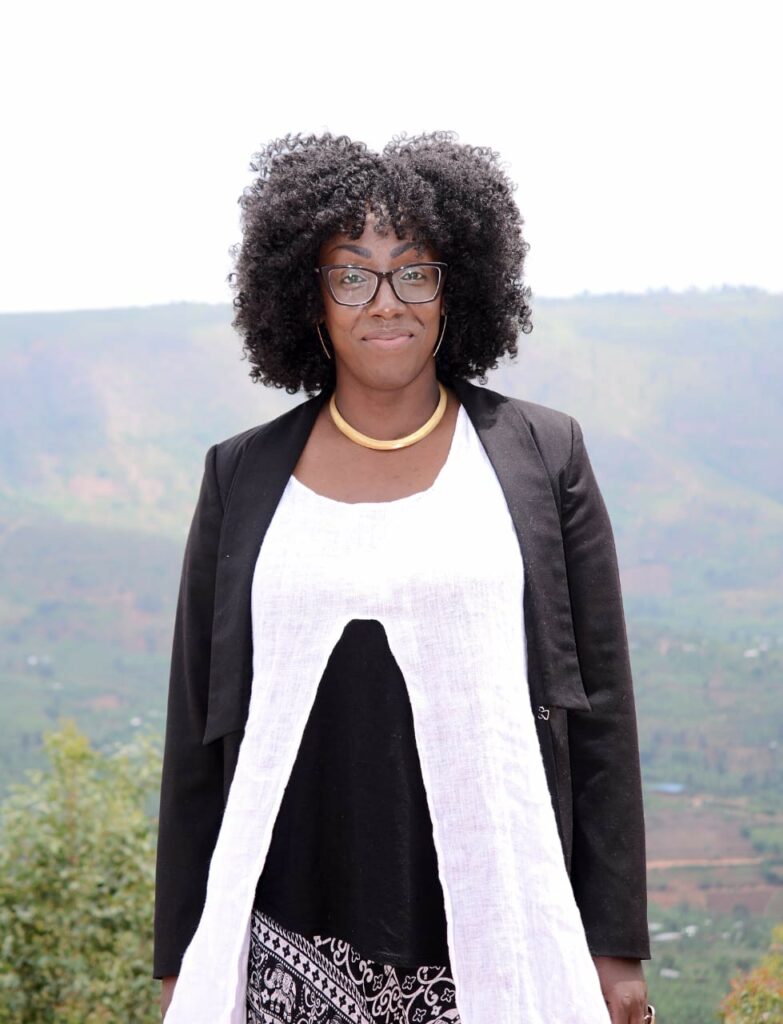
According to a 2016 report by Norton Rose Fulbright, Ethiopia is the largest producer of honey in Africa with approximately 45,300 tons annually. Tanzania is the second-largest producer, Kenya ranks third, followed by Uganda and then Rwanda, with around 4,000 tons a year.
“The honey market in Rwanda is not that big, but everyone is more conscious [about their food choices] since Covid-19,” says Jeanne Sheila Uwibona. “People are [trying to be] healthier, so they are buying more honey instead of sugar. But there’s no big demand, not like maybe other African countries or Arabic countries.”
Based in Kigali, the Sheila’s Honey founder owns both a bee farm, and a restaurant and café, which serves customers different flavors of honey. Uwibona shares her experience of the early stages of this endeavor. “The most challenging thing was getting the certification [to do this]. It was really hard. First, I was asked to get a big house [because you’re doing beekeeping]. And the house has to be equipped with all the stuff that [the bees] need. That was very expensive.
“But I did it. I took a risk and got a house for $2,000, and that was just after Covid-19.”
The business has worked with local female farmers and established an empowerment movement. Sheila’s Honey is also devoted to working with Rwandan beekeepers to produce 100% pure raw honey.
Uwibona is looking to export to Japan and the European Union, in particular, focusing on small, professionally-packaged quantities, to gain exposure for the honey. “The only advice I would like to give, especially to the young generation of today is to focus on whatever you are planning to do. I always advise them to go back to school – you shouldn’t stop your life after high school only because you want to get a job. You still have another future after university and there are always options. You just have to remain focused on the end goal.”
PHUMLA MOTSA
Founder • Motsa Health (Remote Ergonomics)
Sector • Occupational Therapy
South Africa
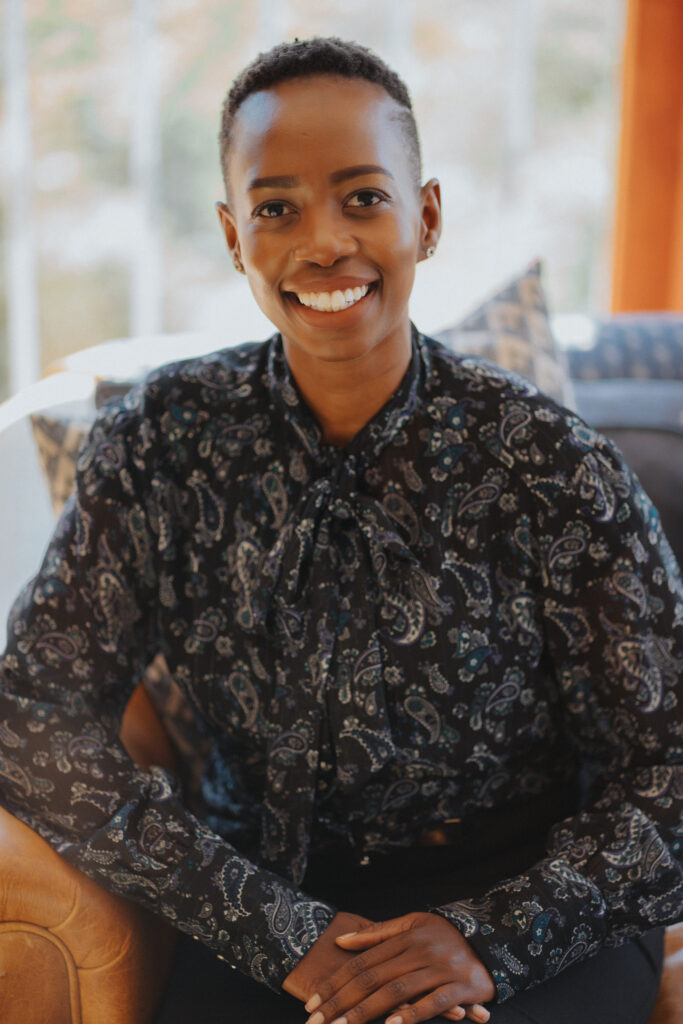
For seven years, Phumla Motsa worked for a corporate in South Africa as a health risk manager. In 2015, her husband died suddenly from an aneurysm.
“I had a five-year-old and a two-year-old. And I was like, ‘how am I going to parent these two boys?’” the founder of Motsa Occupational Therapy tells FORBES AFRICA.
It was this loaded moment that motivated Motsa to start her own practice as an occupational therapist, while being able to still be there for her kids.
Three years into running her practice, the Covid-19 pandemic hit, highlighting a growing need for ergonomic services tailored to the increasing number of people who worked from home.
Motsa says she saw, first-hand, how poor remote work setups contributed to physical discomfort, decreased productivity and injury. This inspired her to launch Remote Ergonomics, a business aimed at helping individuals and companies optimize their workstations for better health and performance.
And although her ‘why’ for the business is heart-breaking, the ‘how’ seems to be making up for it.
“The freedom in terms of being able to do your work when you want to do it is amazing – the freedom of creativity,” she explains.
“I will have an idea, put money into that idea, research [and put] time into it. Then I see the fruit, I tweak it, and it’s all just [about] what I put into it.
“Having your own business is great for your soul because if you can hit that sweet spot of creating value and getting paid for that value, it’s a very beautiful journey to be on.”
ALEXANDRIA PROCTER
Founder • House of Pharos; DigsConnect
Sector • Tech and Finance
South Africa

“I think I’m not the kind of person that takes a break, to be honest,” Alexandria Procter says with a hearty laugh. She beams with pride as she shares with FORBES AFRICA the story of her latest venture, when we meet her in Johannesburg in November.
“Pharos is a venture house, which is a word I basically made up one day. It encapsulates a venture capital fund and a venture studio, so that’s basically taking ideas and splitting it up into ventures, start-ups, scale-ups and then, eventually, exit IPO,” Procter explains.
“The idea itself came from when I was working in my first company. I had started [it] as a student at the University of Cape Town and that was an incredible journey. I did that for about six and a half years, and stepped down as CEO in April this year.”
She adds that she has always wanted to build a venture capital fund and, as it turns out, everything fell into place at the right time for her. “I love ventures; I love startups as vehicles to create solutions for the world’s biggest issues. They are so effective, so efficient, and really fun. It’s a great way to look at the biggest issues facing humanity and package solutions in a really fantastic way.”
She is also a director of South Africa’s National Youth Development Agency and recently published her first book, Up- start. Procter adds that this has been a career highlight for her. “There’s been so many incredible moments shared with so many amazing people. One that does stand out is I published my first book this year. I love writing. I love the power of storytelling to change people’s lives.
“I was sitting on stage, and I was doing a reading from the book. Afterwards, I came off the stage, and it was extraordinary. Everyone queued up to get the book signed and, as everyone came up, they told me their story of entrepreneurship and what the book meant to them in terms of inspiration.”
LINDIWE NKUNA-KGOPA
Founder • Lindiwe Sanitary Pads
Sector • Manufacturing and Distribution/Education
South Africa
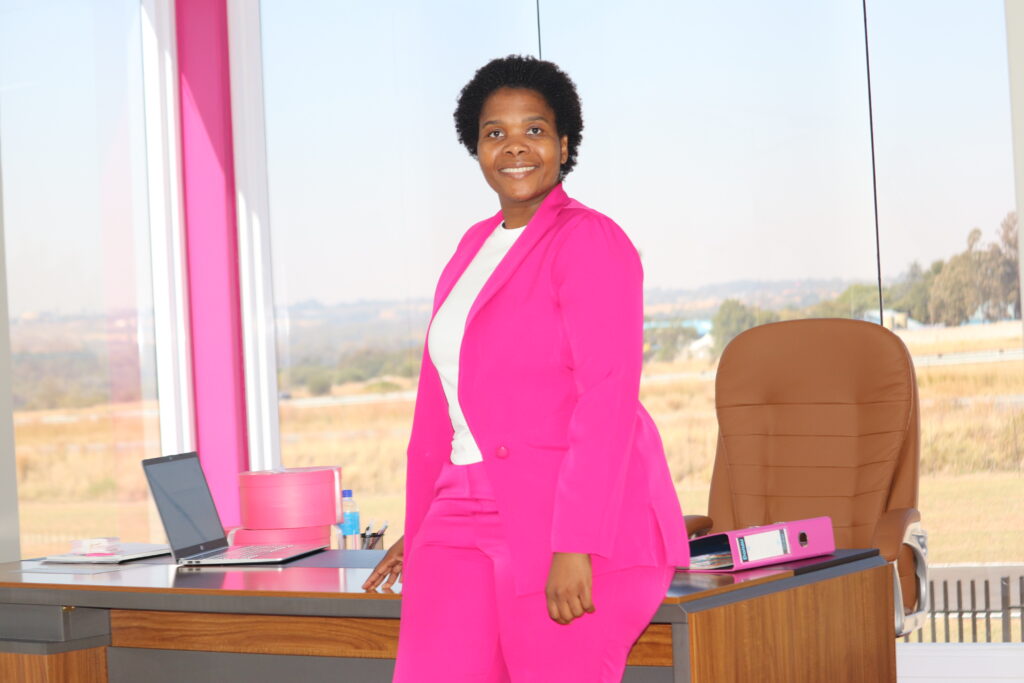
“I feel like society is encouraging us to speak about menstruation in places where they don’t really matter… something we speak about only behind closed doors,” Lindiwe Nkuna-Kgopa tells FORBES AFRICA.
“I created Lindiwe Sanitary Pads so that women can move from just being end-users of sanitary pads to be part of what I call ‘the mainstream menstrual economy’. They can be active participants in the value chain of the production of sanitary pads.”
The founder and advocate for education has established a large-scale sanitary pad manufacturing plant in South Africa, which, the company reports, is run entirely by women and capable of producing 800 pads per minute.
“When I founded it, it was just out of excitement and for changing the status quo in South Africa. I didn’t have the necessary experience; it was just me and my big dream of wanting to change things,” Nkuna-Kgopa explains.
She reflects on a pivotal moment where she had to decide to either quit or keep going and work to become “fundable”.
“I decided to build that profile – it took me six years while selling at a loss but I got to gain some market share, got to build a brand, have some reputation in the market and was then able to have a tangible business case that funders and investors found bankable.”
Nkuna-Kgopa emphasizes the importance of encouraging and supporting entrepreneurship while creating an environment for it to thrive.
“Through entrepreneurship, we’re able to create generational wealth, employment, help combat gender-based violence – we can create jobs for women to be financially- independent.”
She adds that her advice would be “not to doubt one’s self; to never lose that self-belief”.
“Sometimes the things we do not achieve is not because we cannot, it’s because we’re not bold enough or we are afraid of taking the risk. Continue being as brave as you are,” concludes Nkuna-Kgopa.
KHAYA BURWANA
Founder • Agrikey Farming
Sector • Agriculture and Farming
South Africa
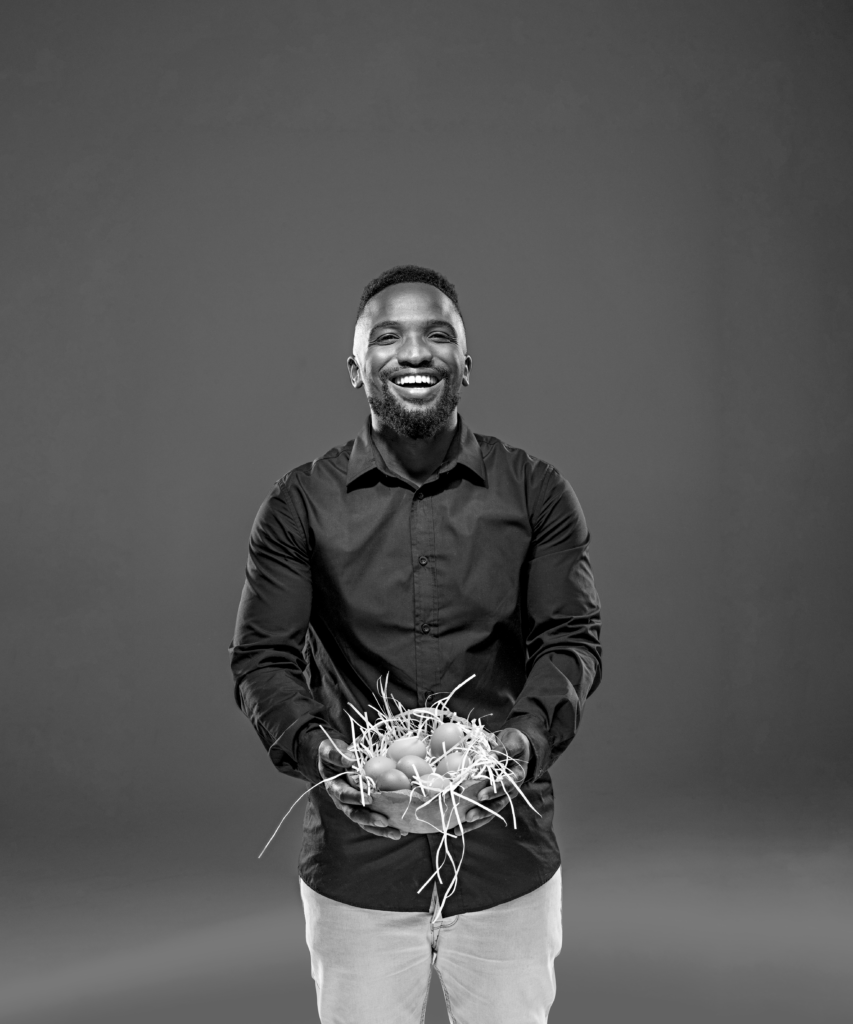
haya Burwana has always had a passion for business and entrepreneurship. Despite studying information technology, the foray into agriculture and farming was a natural step for him.
“I’ve been in farming for most of my life, growing up in South Africa’s Eastern Cape province. We had cattle, the livestock there, but I didn’t see the business part of it. It was more [about] duties,” the founder of Agrikey Farming explains.
“As I grew up, I saw that there’s so much opportunity, especially in the urban areas; most people are consumers this side. So since there are so many consumers, let me produce for them with the experience that I have had.”
The company, based in South Africa’s Western Cape province, specializes in poultry and vegetables. Burwana reveals that he also has hydroponic structures. Determined to learn as much as he could, he furthered his studies in agriculture and explains what sets the company apart from others.
“It’s mainly because I’m always looking to grow the business, having only started with chickens. I’ve [now] got chickens that produce eggs, and I’ve grown to crop production, [with a] piggery as well. Now we currently have an abattoir,” says Burwana, who now also has a small team.
“We also give back to the community. We approached one school where we offered to build hydroponic structures there. [We] wanted to ensure that we also teach the kids about agriculture, to produce their own food, take care of the crops. At this point, we support about five schools where we have food gardens. When it’s ready to harvest, we do market days where we sell to communities and to schools.”
Burwana adds, “We’re not only focusing on making the money, but also changing the communities, adding value to what they do and teaching them food production as well.”
Burwana was one of the winners of Woolworths South Africa’s 15 Youth Makers competition in 2024.
MARIAM ABIOLA OWOLEWA
Founder • Wearyen Studios
Sector • Sustainable Fashion
Nigeria

Mariam Owolewa’s mother, Remilekun Deborah, discovered her daughter’s creativity and potential at an early age. She encouraged Owolewa to try her hand at fashion design advice she would only act on years later – but she resisted at first as she had a passion for photography.
“Two months into it, I fell in love with fashion,” admits Owolewa, the founder of Wearyen Studios.
This unexpected shift led her to a world where she could combine her penchant for storytelling with another mission close to her heart – sustainable fashion. It became the hallmark of Wearyen Studios, a brand intent on revolutionizing the clothing industry by using unconventional materials.
“We use metals, plastics – anything that might be lying around. It’s not just fashion; it’s about breathing life into things discarded by society,” Owolewa explains.
“Our creations are unlike everyday garments; they’re bold statements crafted to make people stop, think, and admire. These pieces, often one-of-a-kind hats and accessories, find homes in exhibitions, fashion shows and galleries rather than ordinary closets.’’
But launching a sustainable fashion brand hasn’t been easy, especially in a landscape that doesn’t readily fund new ventures. Owolewa recounts the frustration of securing finances for her business, the endless rejections, and the skepticism she faced.
“Being different in this country is risky,” she admits. “People don’t want to test new things, they want to stay comfortable.”
Wearyen Studios has slowly gained traction – in 2024, it was showcased on platforms like Showmax’s Style Magnate.
For Owolewa, the dream is not just about creating a profitable brand but about reshaping the way people perceive fashion and waste. As she puts it, “Fashion has changed my life. It’s therapeutic, it’s powerful, and I want to share that with the world.”
CHANTELLE DE BRUYN
Founder • Buttercup Farmhouse
Sector • Food Services and Retail
South Africa
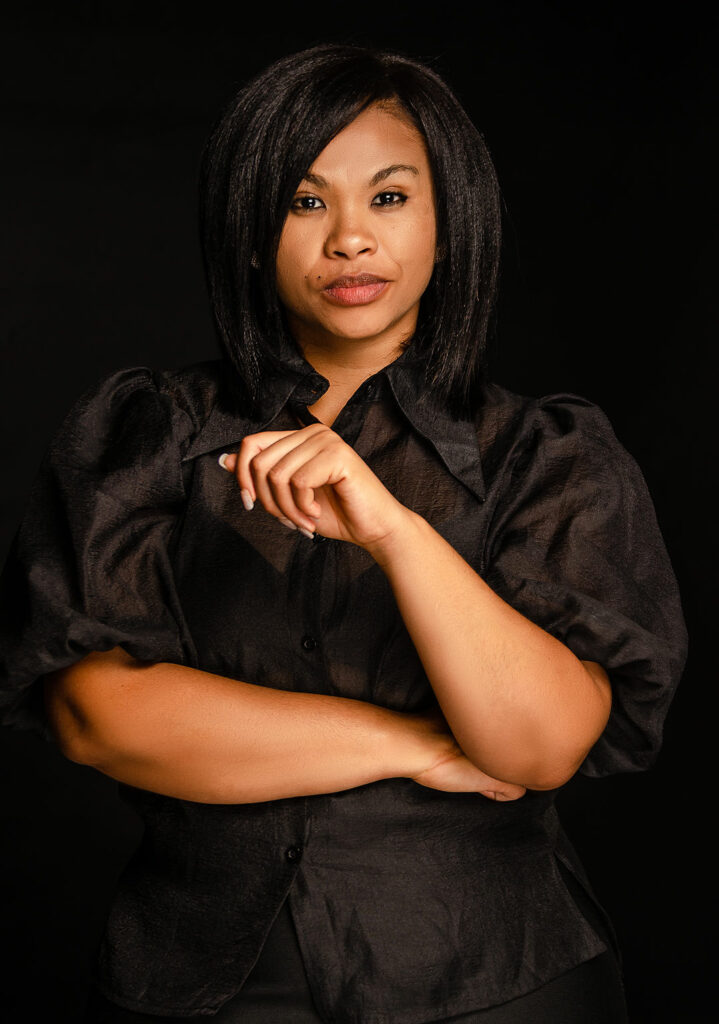
Chantelle de Bruyn’s current endeavor, Buttercup Farmhouse, isn’t her first business venture, but she admits to FORBES AFRICA that this one hit home.
“I registered the business with no idea what I would be doing. My first concept was that I would definitely go into something to do with agriculture.”
Then, a family crisis led to its denouement.
“Mid-2020, we had a health scare at home when my grandfather was diagnosed with liver and kidney infection due to all the caffeine he had been consuming… we had to get to a solution for this problem,” she says.
“Months [later], the doctors found that whatever we had been giving him had contributed positively to his health report. I had developed a [coffee] product for him that he could consume, because his diet had to change.”
This rewarding experience led to the creation of the business’ unique organic ground vegetable coffee.
The development, compliancy and certification process took time but it was worth it. According to de Bruyn, her butternut-derived coffee “tastes like a dream”.
On the importance of entrepreneurship, de Bruyn explains that it’s about more than just job creation, innovation and economic growth.
“For me, the focus was more on community development. As local entrepreneurs, we often invest in our communities, in creating an opportunity for social development. In the business, we have now empowered local female farmers to plant and harvest for us. It’s just to empower the residents in our area.
“Number two, what I’ve learned… it [is] to [create] resilience for each and every individual to become independent.”
GRAEME BETTLES
Founder • Doggo South Africa
Sector • Pet Services
South Africa

Graeme Bettles will gladly tell you that he has the best job in the world.
“It does involve a lot of licking [though],” he says with a laugh. “But it doesn’t get better than getting to spend your days with dogs, even though it’s quite a serious responsibility.
“There are a lot of people who would likely change their careers if they could [and] spend every day looking after an amazing range and variation of dogs.”
Having always loved dogs, and after growing other people’s brands for years, Bettles was ready for the opportunity to grow his own.
“I was rather jaded at that point, with the marketing industry, and just not being my own boss,” tells the founder of Doggo to FORBES AFRICA.
“The main reason [for] moving into [the pet services] industry was to find something that I felt had a lot of potential, but also something I could build into my own brand. I think that happened to just be incidental but, at the same time, it happens to be a passion of mine too.”
According to the Entrepreneur of the Year (EOY) Awards SA, in which Bettles was a 2023 emerging business finalist, he began the business with R80,000 ($4,400), going on to become South Africa’s largest day care and boarding in under four years. The company has five branches, all located in South Africa’s Mother City, Cape Town, and equipped with boarding and grooming ‘spa’ facilities.
FRANCIS NDERITU
Founder • Keep IT Cool
Sector • Food Waste/Logistics and Solutions
Kenya
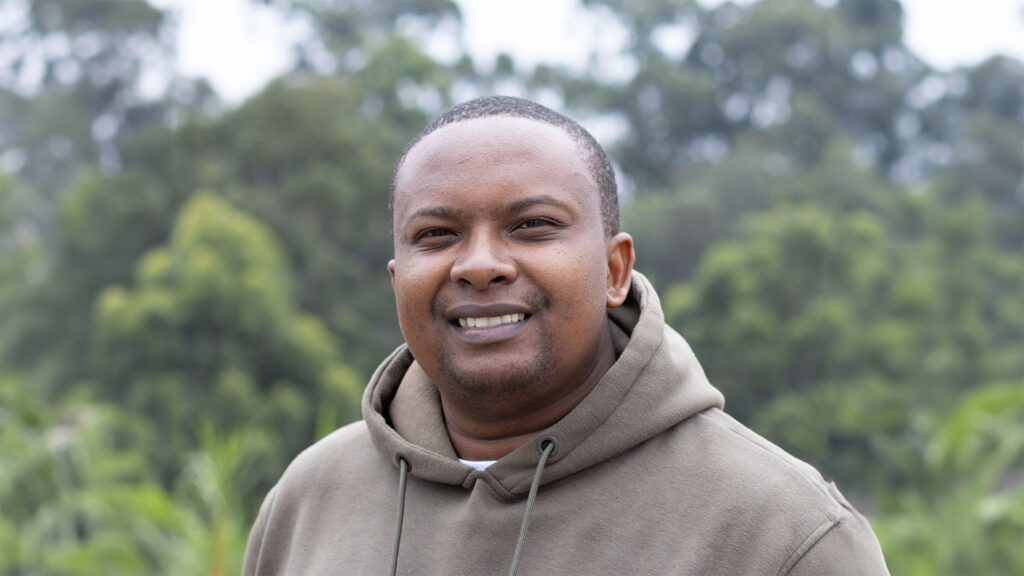
In November, Prince William traveled to South Africa to present awards to the five 2024 Earthshot Prize winners.
One of them was Kenyan founder, Francis Nderitu.
He established his business model for Keep IT Cool on the premise that 40% to 50% of produce in sub-Saharan Africa is lost before it reaches consumers.
“When we started, we never thought it was going to be this big,” he tells FORBES AFRICA.
“This is probably the highlight of everything that we’ve been doing. We feel encouraged, supported, and we like that the world is watching and cheering us on as we make solutions for our respective communities.”
Having grown up in a farming family and seeing the amount of waste produced, Nderitu sought to address the challenge of food spoilage by providing solar-powered, sustainable, localized refrigeration systems that help small farmers and fishers preserve their produce. It also helps to ensure that the catch stays fresh while transporting it to market.
“The inspiration came from my family problems in trying to sell their produce as farmers. It was a very personal, driven solution but it ended up working on a different value chain model.
“Winning the [Earthshot] prize was such an amazing moment, and it is good validation for the business we are doing, and also for the impact that we are making in this part of the world.”
THANDO MAKHUBO
Founder • Soweto Creamery
Sector • Food Services
South Africa

Ask any entrepreneur and they’ll tell you that there’s nothing sweeter than seeing an idea on paper grow into a fully-fledged business. In 2020, during the height of the Covid-19 pandemic, the founder of Soweto Creamery, Thando Makhubu, used the grant provided by the South African government for those who were unemployed, and did just that.
“The government said if you’re unemployed, you can apply for the ZAR350 ($20) grant. I applied and I used that to start Soweto Creamery. People who know me know that I’m a foodie. I have a sweet tooth as well. I was on the internet, I saw this ice cream, which was interestingly made, and I was like, ‘let me just try it out’,” he says.
“I snapped images of those two ice creams, which were Chocolate Overload and Planet Sweetness, and then I shared it with friends and family. One of my friends is Mohale [Motaung]. At the time, his Instagram was approaching a million followers – he posted us, and we just blew up from there.”
From two flavors to more than eight today, Makhubu, who admits that his personal favorite is the iFruitiza Fresh Fruit Sorbet, also explains that his background in fashion and photography played a part in how he created and marketed the products.
“My career highlights are obviously opening up a store at The Glen Shopping Center [in Johannesburg]; being mentioned by the president of the country [Cyril Ramaphosa] in [his] State of the Nation Address; and operating for four years now. It has really been exciting for us,” he adds. “Entrepreneurship… I think it’s very important, because, as you know, the country’s unemployment rate is really high. If the government finds a way to support us, we can help them try and reduce unemployment and obviously bring back the confidence of the youth in our country.”
ARMELLE TOUKO
Founder • Adinkra Jeunesse
Sector • Publishing
Cameroon
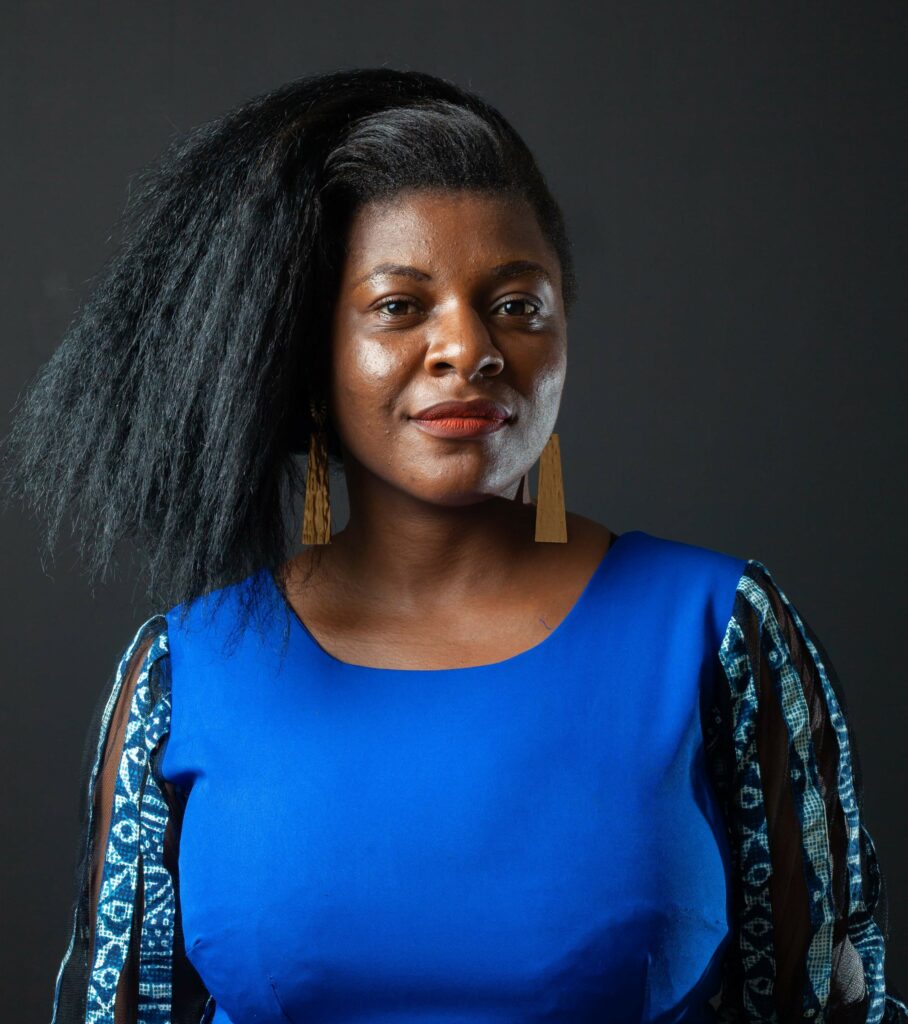
Armelle Touko recalls a conversation with her nine-year-old daughter, Marie, one afternoon when the little girl enquired: “Mom, why does my hair look different from hers?”
Marie was referring to one of her favorite cartoon characters – blonde and blue-eyed in a story that held no link to Africa or the home they knew.
It was innocent curiosity but Touko felt it in her bones.
She had grown up in Cameroon, paging through books that told stories of princesses and heroes who looked nothing like her. Touko decided then and there that she wouldn’t let her daughter, or any African child, grow up without stories that reflect their reality.
“Through each story… we tell each child, ‘you exist, you have a story, and you are important’,” Touko tells FORBES AFRICA.
Adinkra Jeunesse, the digital book publishing platform she launched in 2021, shares stories of African heroes and legends and celebrates their cultures with adventures set in a relatable landscape.
Touko fondly refers to Marie as her cofounder and inspiration.
However, setting up the business was no small feat. From overcoming low bank penetration by integrating mobile payments to developing an app that works offline for children with limited internet access, Touko and her team took each challenge head on.
“When we couldn’t find funding, we turned to our community, ran crowdfunding campaigns, and participated in competitions,” she adds.
The platform’s accolades include the Orange Social Entrepreneur Prize in Africa and the Middle East, the IFC Innovation Label Prize and the AFD Digital Challenge.
Adinkra Jeunesse also introduces books to children through the 100 Little Readers initiative, making reading an adventure to look forward to.
TOLULOPE OLUKOKUN
Founder • ThinkBikes
Sector • Electric Transportation
Nigeria
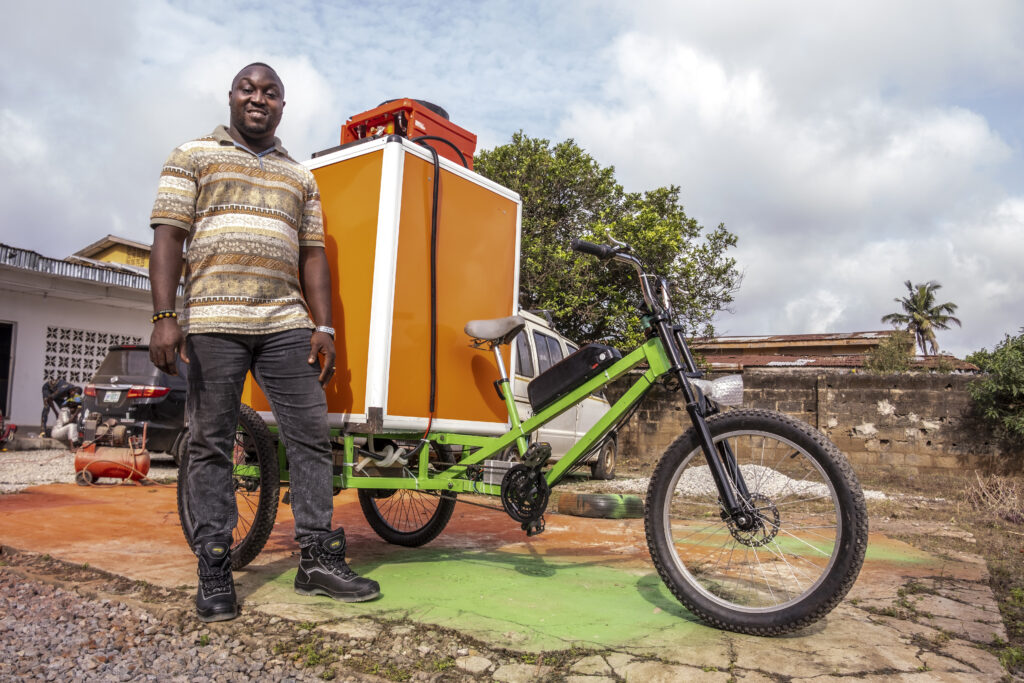
Entrepreneur Tolulope Olukokun still remembers the day in early 2012 when he first pondered the idea of electric vehicles as a pragmatic alternative, especially in light of the frustration of fuel shortage challenges at the time. It was during the Occupy Nigeria protests that took place between January 2 and 14 that year.
“I contacted them [a known vehicle brand], hoping it might be a solution, but they told me it wasn’t meant for Nigeria,” he recalls to FORBES AFRICA.
Without the necessary infrastructure, particularly electricity, electric cars weren’t feasible in a country plagued by power cuts and limited charging networks. However, this proved to be the beginning of the journey for Olukokun.
“Equipped with degrees in Mechanical Engineering [major in Automobile Engineering] and Industrial Production, I dug deeper, using my technical background to explore how I might create a viable electric vehicle solution,’’ says Olukokun.
He then began to assess how the average person could access these electric solutions, finding an answer only when he attended a rural impact program. It brought him face-to-face with the tangible needs of the country’s smallholder farmers.
Backed by a modest grant from Siemens, in 2021, Olukokun, with support from a small team, including several students, started building ThinkBikes, a company that seeks to reimagine transportation solutions with electric cargo bikes.
“We wanted farmers to improve their economy by at least 25% to 50%; they don’t have to be losing 50% of produce, and we wanted to encourage even younger people to get into farming,” Olukokun explains.
“When we started, we faced a number of questions pertaining to no electricity in rural communities, but do you know there are mini-grids in those communities right now? It’s majorly strategic for us to put our products or connect farmers to those mini-grids in order to charge their bikes.”
ThinkBikes also offers rental options, for those who can’t afford to buy the product, in which maintenance and charging come bundled with the service.
MARGARET YAINKAIN MANSARAY
Founder • Women in Energy Sierra Leone Limited (Smart Green Stove)
Sector • Clean Energy Solutions
Sierra Leone

Margaret Yainkain Mansaray is troubled by the stark reality of energy poverty. In her eyes, it isn’t just firewood that women and girls carry in a particular rural pocket of Sierra Leone; it is the weight of a drawback that has gone on for generations. It was this realization that marked the creation of the Smart Green
Stove in 2019, and, later, the Smart Green Briquette.
“I started with a vision to create an accessible, affordable, and reliable source of green energy for women who were most vulnerable to energy poverty,” she tells FORBES AFRICA.
As an energy practitioner conducting her thesis on gender mainstreaming in clean cooking energy, Mansaray knew she had to bridge this gap. She began her journey alone, crafting a prototype for her dissertation.
“I never imagined that little prototype would reach over 2,000 households,” she admits. “It was curiosity that drove me to start production.”
Her path was anything but straightforward.
Some of her classmates from Njala University joined her initially, then drifted away, leaving her to rebuild from scratch. During this process, she taught herself to not only create efficient stoves but also lead, train, and inspire a team.
By 2020, Mansaray founded Women in Energy Sierra Leone Limited, a company that now boasts a team of 20 members, predominantly women. She was also one of 15 candidates selected for the 2023 Africa Prize for Engineering Innovation, founded by the Royal Academy of Engineering.
According to Mansaray, the stoves have garnered attention beyond Sierra Leone, with one client journeying from Liberia to purchase them. She has plans for expansion, with additional machinery, and is exploring the potential of new markets like Guinea and Liberia.
Loading...
